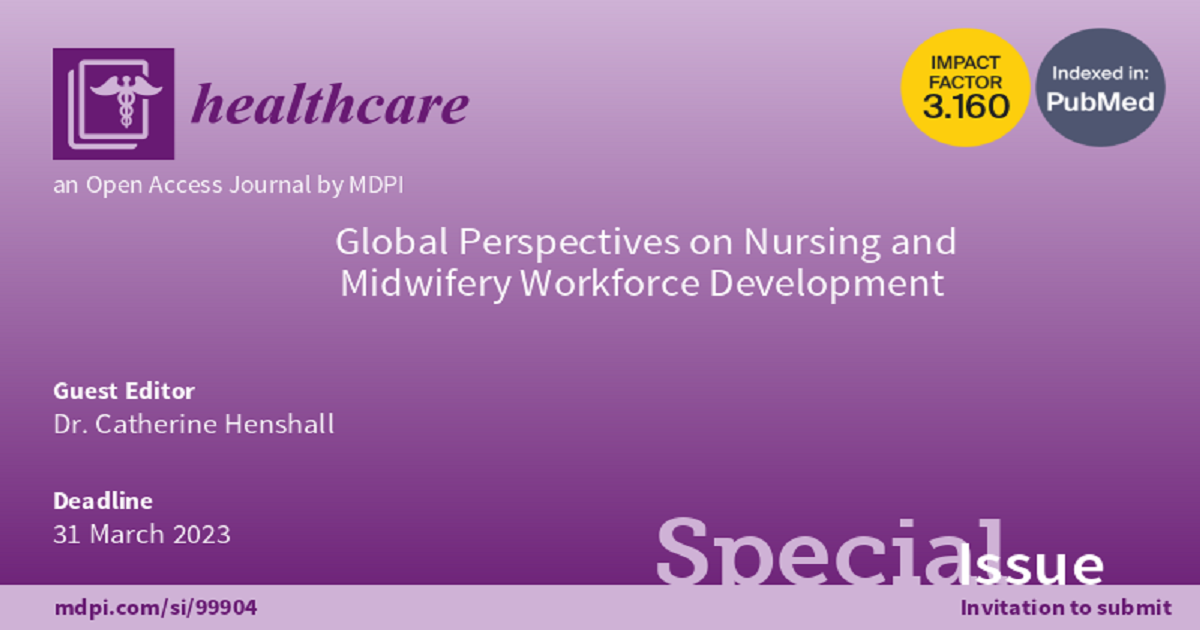Global Perspectives on Nursing and Midwifery Workforce Development
A special issue of Healthcare (ISSN 2227-9032). This special issue belongs to the section "Nursing".
Deadline for manuscript submissions: closed (31 March 2023) | Viewed by 42756

Special Issue Editor
Interests: cancer survivorship; self-management of long-term conditions; mental health; nursing workforce development; research leadership
Special Issue Information
Dear Colleagues,
Nurses and midwives are the largest group of healthcare professionals worldwide and are continually engaged in driving forward changes to healthcare practice. Nurses and midwives provide more patient-facing care than other healthcare professionals and, because of their close proximity to patients, are able to rapidly adapt and respond to international public health challenges. The recent COVID-19 pandemic has illustrated nurses’ and midwives’ expertise and ability to work flexibly and adeptly in the face of mounting clinical challenges. This means that they are expertly positioned to contribute to and shape healthcare policy and practice through harnessing their knowledge, skills and practice to improve service delivery and care outcomes.
However, despite their positioning, nurses and midwives often lack opportunities to lead others within the healthcare system, and this can lead to decreased confidence and engagement. Reasons for this are multifaceted and include a lack of protected time to undertake continuing professional development activities, a lack of structured research training beyond registration, uncertain career progression pathways, a lack of mentorship and role-modelling and limited buy in from partner organizations for nurses and midwives to take on leadership roles.
With this in mind, this Special Issue is soliciting manuscripts addressing topics related to strategies, initiatives and interventions designed to facilitate nursing and midwifery workforce development. Original articles and reviews on nursing and midwifery workforce development initiatives, as well as on the evaluation of such strategies and initiatives in the workplace are invited. Papers that focus on various aspects of nursing and midwifery workforce development, such as research, leadership, education and advanced practice are of particular interest. Papers seeking to explore the knowledge and perceptions of healthcare staff and managers on issues relating to workforce development in relation to recruitment, retention and wellbeing will also be considered. Papers that consider the roles of clinical academics in underpinning and developing the nursing and midwifery evidence-base are of interest, as are papers that focus on the nursing and midwifery workforce pipeline, from pre-registration through to senior nursing and midwifery leadership roles. Additionally, papers that illustrate, across an international context, how nursing and midwifery leadership can influence policy and practice and contribute to capacity and capability building across the professions are of relevance to this issue.
The aim of this Special Issue is to provide an updated picture of the current nursing and midwifery landscape in relation to building and sustaining the workforce and developing the profession. The influence and visibility of an evolving nursing and midwifery workforce are of paramount importance at a global level, with widespread effects on health and care services, organizational efficiency, staff wellbeing and patient care quality and safety outcomes.
Dr. Catherine Henshall
Guest Editor
Manuscript Submission Information
Manuscripts should be submitted online at www.mdpi.com by registering and logging in to this website. Once you are registered, click here to go to the submission form. Manuscripts can be submitted until the deadline. All submissions that pass pre-check are peer-reviewed. Accepted papers will be published continuously in the journal (as soon as accepted) and will be listed together on the special issue website. Research articles, review articles as well as short communications are invited. For planned papers, a title and short abstract (about 100 words) can be sent to the Editorial Office for announcement on this website.
Submitted manuscripts should not have been published previously, nor be under consideration for publication elsewhere (except conference proceedings papers). All manuscripts are thoroughly refereed through a single-blind peer-review process. A guide for authors and other relevant information for submission of manuscripts is available on the Instructions for Authors page. Healthcare is an international peer-reviewed open access semimonthly journal published by MDPI.
Please visit the Instructions for Authors page before submitting a manuscript. The Article Processing Charge (APC) for publication in this open access journal is 2700 CHF (Swiss Francs). Submitted papers should be well formatted and use good English. Authors may use MDPI's English editing service prior to publication or during author revisions.
Keywords
- nurses
- midwives
- workforce
- leadership
- research
- career pathways
- staff wellbeing
- capacity building
- capability building
- education
- skill development
- burnout
Benefits of Publishing in a Special Issue
- Ease of navigation: Grouping papers by topic helps scholars navigate broad scope journals more efficiently.
- Greater discoverability: Special Issues support the reach and impact of scientific research. Articles in Special Issues are more discoverable and cited more frequently.
- Expansion of research network: Special Issues facilitate connections among authors, fostering scientific collaborations.
- External promotion: Articles in Special Issues are often promoted through the journal's social media, increasing their visibility.
- e-Book format: Special Issues with more than 10 articles can be published as dedicated e-books, ensuring wide and rapid dissemination.
Further information on MDPI's Special Issue policies can be found here.






